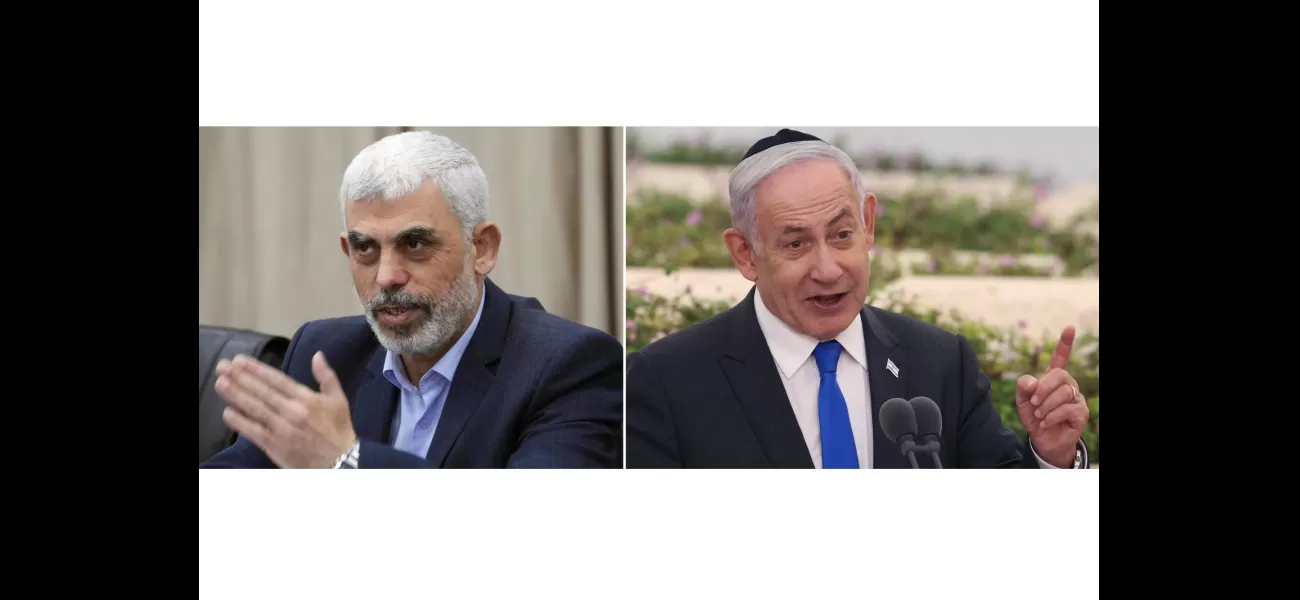Cease-fire proposal's success depends on Israeli PM Netanyahu and Hamas leader in Gaza.
Leaders are dealing with intense external and internal forces that could affect their choices.
June 21st 2024.

The fate of the proposed cease-fire deal for Gaza hangs in the balance, and all eyes are on two key figures: Israeli Prime Minister Benjamin Netanyahu and Hamas' leader in Gaza, Yahya Sinwar. Both leaders are facing immense political and personal pressures, which may be influencing their decision-making. As a result, neither seems to be in a hurry to make concessions and end the devastating eight-month-long war, which has also resulted in the kidnapping of hostages by Hamas in their October 7 attack.
While Hamas has accepted the overall framework of the plan, they have raised concerns and requested changes. On the other hand, Netanyahu has publicly expressed his reservations about certain aspects of the deal, even though it has been presented by the U.S. as an Israeli initiative. One of the main sticking points is how to transition from a temporary truce in the first phase of the deal to a permanent cease-fire that includes an end to the fighting and the withdrawal of Israeli troops from Gaza.
Let's take a closer look at the factors that may be driving these two leaders. Netanyahu, a long-serving and often criticized leader, has faced scrutiny for letting his political interests interfere with his decision-making during this war. His government is supported by two ultranationalist parties that oppose cease-fire deals and instead advocate for continued military pressure to defeat Hamas and free the hostages. They also talk about reestablishing Israeli settlements in Gaza, which were dismantled in 2005 after a 38-year occupation. Netanyahu himself has taken a tough stance, stating that the war will not end until Hamas' military and governing capabilities are destroyed.
However, with his hard-line partners threatening to bring down the government if a cease-fire is reached, Netanyahu finds himself in a difficult position. He relies on their support to remain in power, especially after a member of his war Cabinet, former military chief Benny Gantz, resigned due to frustrations with Netanyahu's handling of the conflict. Balancing internal pressures with demands from the U.S. administration and the families of hostages who believe only a deal can secure their loved ones' release, Netanyahu appears to be siding with his far-right governing partners for now, despite his claims of having the country's best interests in mind.
His reliance on these partners to stay in power has also opened him up to the possibility of facing new elections, which could lead to his downfall and the start of investigations into the failures of October 7. Additionally, Netanyahu is currently on trial for corruption, a case that has continued throughout the war but has faded from the public's attention. A potential cease-fire deal could bring the spotlight back to his legal troubles, something he vehemently denies. Surprisingly, his popularity has actually improved during the course of the war, although he would still face a tough path to reelection.
According to Gideon Rahat, a senior fellow at the Israel Democracy Institute and chairman of the political science department at Hebrew University, Netanyahu is "buying time" by prolonging the war. Rahat also suggests that the Israeli leader may be hoping for the return of former U.S. President Donald Trump to office, which could potentially give Israel more flexibility in its fight against Hamas. While it may seem like Netanyahu holds all the cards, he is not the only one in control of the situation.
On the other side, Hamas' leader in Gaza, Yahya Sinwar, also does not seem to be in a hurry to sign on to a deal. While the group's exiled leadership may have varying opinions on the matter, Sinwar, who was the mastermind behind the October 7 attacks, holds significant influence. As a Hamas loyalist who spent years in Israeli prisons, he has personal motivations to keep the war going.
Aside from concerns for his own life, as Israel has vowed to kill him in response to the October attack and he is believed to be hiding deep within Gaza's underground tunnels surrounded by Israeli hostages, Sinwar also has ideological reasons for prolonging the war. He seeks Israel's destruction and has gained political leverage by watching the war take a toll on Israel's international standing and garner support for the Palestinian cause. The country has faced widespread criticism and accusations of genocide, and the International Criminal Court has even called for the arrest of Israeli leaders.
Ahmed Fouad Alkhatib, a senior fellow at the Atlantic Council, notes that Sinwar is also counting on the global outrage over the killing of Gazans to pressure Israel into ending the war on his terms. However, once the war ends, Sinwar may face difficult questions, not only about his role in the October attack but also from the Palestinian public as the true extent of the devastation and the lengthy reconstruction process becomes apparent.
Despite the high price paid by Palestinian civilians in Gaza, Sinwar is not deterred, viewing it as a necessary sacrifice on the path to liberation. For him, continuing to resist Israel's powerful army, even in small pockets, is a way to deny them a victory. As Khaled el-Gindy, a senior fellow at the Middle East Institute, puts it, "Their whole mission is to survive. If they survive, they win."
While Hamas has accepted the overall framework of the plan, they have raised concerns and requested changes. On the other hand, Netanyahu has publicly expressed his reservations about certain aspects of the deal, even though it has been presented by the U.S. as an Israeli initiative. One of the main sticking points is how to transition from a temporary truce in the first phase of the deal to a permanent cease-fire that includes an end to the fighting and the withdrawal of Israeli troops from Gaza.
Let's take a closer look at the factors that may be driving these two leaders. Netanyahu, a long-serving and often criticized leader, has faced scrutiny for letting his political interests interfere with his decision-making during this war. His government is supported by two ultranationalist parties that oppose cease-fire deals and instead advocate for continued military pressure to defeat Hamas and free the hostages. They also talk about reestablishing Israeli settlements in Gaza, which were dismantled in 2005 after a 38-year occupation. Netanyahu himself has taken a tough stance, stating that the war will not end until Hamas' military and governing capabilities are destroyed.
However, with his hard-line partners threatening to bring down the government if a cease-fire is reached, Netanyahu finds himself in a difficult position. He relies on their support to remain in power, especially after a member of his war Cabinet, former military chief Benny Gantz, resigned due to frustrations with Netanyahu's handling of the conflict. Balancing internal pressures with demands from the U.S. administration and the families of hostages who believe only a deal can secure their loved ones' release, Netanyahu appears to be siding with his far-right governing partners for now, despite his claims of having the country's best interests in mind.
His reliance on these partners to stay in power has also opened him up to the possibility of facing new elections, which could lead to his downfall and the start of investigations into the failures of October 7. Additionally, Netanyahu is currently on trial for corruption, a case that has continued throughout the war but has faded from the public's attention. A potential cease-fire deal could bring the spotlight back to his legal troubles, something he vehemently denies. Surprisingly, his popularity has actually improved during the course of the war, although he would still face a tough path to reelection.
According to Gideon Rahat, a senior fellow at the Israel Democracy Institute and chairman of the political science department at Hebrew University, Netanyahu is "buying time" by prolonging the war. Rahat also suggests that the Israeli leader may be hoping for the return of former U.S. President Donald Trump to office, which could potentially give Israel more flexibility in its fight against Hamas. While it may seem like Netanyahu holds all the cards, he is not the only one in control of the situation.
On the other side, Hamas' leader in Gaza, Yahya Sinwar, also does not seem to be in a hurry to sign on to a deal. While the group's exiled leadership may have varying opinions on the matter, Sinwar, who was the mastermind behind the October 7 attacks, holds significant influence. As a Hamas loyalist who spent years in Israeli prisons, he has personal motivations to keep the war going.
Aside from concerns for his own life, as Israel has vowed to kill him in response to the October attack and he is believed to be hiding deep within Gaza's underground tunnels surrounded by Israeli hostages, Sinwar also has ideological reasons for prolonging the war. He seeks Israel's destruction and has gained political leverage by watching the war take a toll on Israel's international standing and garner support for the Palestinian cause. The country has faced widespread criticism and accusations of genocide, and the International Criminal Court has even called for the arrest of Israeli leaders.
Ahmed Fouad Alkhatib, a senior fellow at the Atlantic Council, notes that Sinwar is also counting on the global outrage over the killing of Gazans to pressure Israel into ending the war on his terms. However, once the war ends, Sinwar may face difficult questions, not only about his role in the October attack but also from the Palestinian public as the true extent of the devastation and the lengthy reconstruction process becomes apparent.
Despite the high price paid by Palestinian civilians in Gaza, Sinwar is not deterred, viewing it as a necessary sacrifice on the path to liberation. For him, continuing to resist Israel's powerful army, even in small pockets, is a way to deny them a victory. As Khaled el-Gindy, a senior fellow at the Middle East Institute, puts it, "Their whole mission is to survive. If they survive, they win."
[This article has been trending online recently and has been generated with AI. Your feed is customized.]
[Generative AI is experimental.]
0
0
Submit Comment





